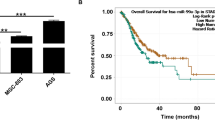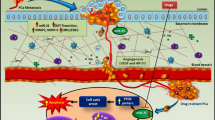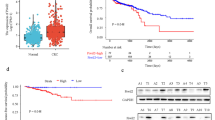Abstract
Background
Pheochromocytoma (PCC) is a catecholamine-producing and neuroendocrine tumor with the 5-year overall survival of advanced stage PCC lower than 40%. Increasing evidence has shown that aberrant expression of microRNAs (miRNAs) plays important roles in the development and chemotherapy resistance of cancers including PCC.
Objective
The tumor-suppressive function of miR-184 has been identified in several types of cancers. The aim of this study is to explore the function and the underlying mechanism of miR-184 in the chemo-resistance of PCC.
Results
miR-184 expression was significantly lower in doxorubicin (Dox)-resistant pheochromocytoma-12 (PC-12) cells and PCC patients. Consistently, in vitro analysis showed that overexpression of miR-184 obviously improved the sensitivity of PC-12/Dox cells, while knockdown of miR-184 sensitised PC-12/Dox cells to chemotherapeutics. To further understand the possible functional mechanism of miR184 in the chemo-resistance of PCC, the targets of miR-184 were predicted. The results of miRDB database suggested A disintegrin and metalloproteinase 22 (ADAM22) carrying the potential complementary binding sites of miR-184 within its 3′-untranslated region (UTR). Further experiments confirmed that miR-184 bound the 3′-UTR of ADAM22 mRNA and down-regulated the expression of ADAM22 in PC-12/Dox cells. Moreover, ADAM22 was overexpressed in Dox-resistant PC-12 cells and PCC patients. Additionally, overexpression of ADAM22 attenuated miR-184-mediated chemo-sensitivity of PC-12/Dox cells.
Conclusion
miR-184 played a role in the chemo-sensitivity of PC-12/Dox cells at least partially via negatively regulating ADAM22. These results suggested miR-184 as a possible novel target to attenuate the chemo-resistance of PCC.





Similar content being viewed by others
References
Bolger JC, Young LS (2013) ADAM22 as a prognostic and therapeutic drug target in the treatment of endocrine-resistant breast cancer. VitamHorm 93:307–321. https://doi.org/10.1016/B978-0-12-416673-8.00014-9
Bravo EL, Gifford RW Jr (1984) Current concepts. Pheochromocytoma: diagnosis, localization and management. New Engl J Med 311:1298–1303. https://doi.org/10.1056/NEJM198411153112007
Caliskan M, Guler H, BozokCetintas V (2017) Current updates on microRNAs as regulators of chemoresistance. Biomed Pharmacother 95:1000–1012. https://doi.org/10.1016/j.biopha.2017.08.084
Charmsaz S et al (2020) ADAM22/LGI1 complex as a new actionable target for breast cancer brain metastasis. BMC Med 18:349. https://doi.org/10.1186/s12916-020-01806-4
Chen D, Liu D, Chen Z (2017) Potential therapeutic implications of miRNAs in osteosarcoma chemotherapy. TumourBiol J IntSocOncodevelopmentalBiol Med. https://doi.org/10.1177/1010428317705762
Fang Z et al (2017a) LncRNA UCA1 promotes proliferation and cisplatin resistance of oral squamous cell carcinoma by sunppressing miR-184 expression. Cancer Med 6:2897–2908. https://doi.org/10.1002/cam4.1253
Fang Y et al (2017b) MicroRNAs in DNA damage response, carcinogenesis, and chemoresistance. Int Rev Cell MolBiol 333:1–49. https://doi.org/10.1016/bs.ircmb.2017.03.001
Farazi TA, Spitzer JI, Morozov P, Tuschl TJ (2015) miRNAs in human cancer. J Pathol 223:102–115
Feng L, Ma J, Ji H, Liu Y, Hu W (2018) MiR-184 retarded the proliferation, invasiveness and migration of glioblastoma cells by repressing stanniocalcin-2. PatholOncol Res 24:853–860. https://doi.org/10.1007/s12253-017-0298-z
He TG et al (2019) Tumor Suppressor miR-184 Enhances Chemosensitivity by Directly Inhibiting SLC7A5 in Retinoblastoma. Front Oncol 9:1163. https://doi.org/10.3389/fonc.2019.01163
Jia Y, Sun R, Ding X, Cao C, Yang X (2018) Bisphenol S triggers the migration and invasion of pheochromocytoma PC12 cells via estrogen-related receptor alpha. J MolNeurosci 66:188–196. https://doi.org/10.1007/s12031-018-1148-5
Kim YJ, Hwang KC, Kim SW, Lee YC (2018) Potential miRNA-target interactions for the screening of gastric carcinoma development in gastric adenoma/dysplasia. Int J Med Sci 15:610–616. https://doi.org/10.7150/ijms.24061
Lamperska KM et al (2017) Different levels of let-7d expression modulate response of FaDu cells to irradiation and chemotherapeutics. PLoS ONE 12:e0180265. https://doi.org/10.1371/journal.pone.0180265
Lee SJ et al (2012) Over-expression of miR-145 enhances the effectiveness of HSVtk gene therapy for malignant glioma. Cancer Lett 320:72–80. https://doi.org/10.1016/j.canlet.2012.01.029
Lenders JW, Eisenhofer G, Mannelli M, Pacak K (2005) Phaeochromocytoma. Lancet 366:665–675. https://doi.org/10.1016/S0140-6736(05)67139-5
Li J et al (2018) miR-449a suppresses tamoxifen resistance in human breast cancer cells by targeting ADAM22. Cell PhysiolBiochem 50:136–149. https://doi.org/10.1159/000493964
Lin BC et al (2016) MicroRNA-184 modulates doxorubicin resistance in osteosarcoma cells by targeting BCL2L1. Med SciMonitInt Med J ExpClin Res 22:1761–1765. https://doi.org/10.12659/msm.896451
Mojarrab M, Mehrabi M, Ahmadi F, Hosseinzadeh L (2016) Protective effects of fractions from Artemisia biennis hydro-ethanolic extract against doxorubicin-induced oxidative stress and apoptosis in PC12 cells. Iran J Basic Med Sci 19:503–510
Parenti G et al (2012) Updated and new perspectives on diagnosis, prognosis, and therapy of malignant pheochromocytoma/paraganglioma. J Oncol 2012:872713. https://doi.org/10.1155/2012/872713
Qin CZ et al (2015) MicroRNA-184 acts as a potential diagnostic and prognostic marker in epithelial ovarian cancer and regulates cell proliferation, apoptosis and inflammation. Pharmazie 70:668–673
Shokoohinia Y, Hosseinzadeh L, Moieni-Arya M, Mostafaie A, Mohammadi-Motlagh HR (2014) Osthole attenuates doxorubicin-induced apoptosis in PC12 cells through inhibition of mitochondrial dysfunction and ROS production. Biomed Res Int 2014:156848. https://doi.org/10.1155/2014/156848
Subramanian M et al (2015) A mutant p53/let-7i-axis-regulated gene network drives cell migration, invasion and metastasis. Oncogene 34:1094–1104. https://doi.org/10.1038/onc.2014.46
Wang YB, Zhao XH, Li G, Zheng JH, Qiu W (2018) MicroRNA-184 inhibits proliferation and promotes apoptosis of human colon cancer SW480 and HCT116 cells by downregulating C-MYC and BCL-2. J Cell Biochem 119:1702–1715. https://doi.org/10.1002/jcb.26330
Wang Z et al (2018) lncRNA epigenetic landscape analysis identifies EPIC1 as an oncogenic lncRNA that interacts with MYC and promotes cell-cycle progression in cancer. Cancer Cell 33:706-720.e709. https://doi.org/10.1016/j.ccell.2018.03.006
Wang R et al (2019) Downregulation of miRNA-214 in cancer-associated fibroblasts contributes to migration and invasion of gastric cancer cells through targeting FGF9 and inducing EMT. J ExpClin Cancer Res 38:20
Wu G, Liu J, Wu Z, Wu X, Yao X (2017) MicroRNA-184 inhibits cell proliferation and metastasis in human colorectal cancer by directly targeting IGF-1R. Oncol Lett 14:3215–3222. https://doi.org/10.3892/ol.2017.6499
Wu N et al (2018) miR-5590-3p inhibited tumor growth in gastric cancer by targeting DDX5/AKT/m-TOR pathway. BiochemBiophys Res Commun 503:1491–1497. https://doi.org/10.1016/j.bbrc.2018.07.068
Yu X, Zheng H, Chan MT, Wu WK (2017) Modulation of chemoresponsiveness to platinum-based agents by microRNAs in cancer. Am J Cancer Res 7:1769–1778
Zheng Q, Chen C, Guan H, Kang W, Yu C (2017) Prognostic role of microRNAs in human gastrointestinal cancer: a systematic review and meta-analysis. Oncotarget 8:46611–46623. https://doi.org/10.18632/oncotarget.16679
Zhou W et al (2017) The lncRNA H19 mediates breast cancer cell plasticity during EMT and MET plasticity by differentially sponging miR-200b/c and let-7b. Sci Signal. https://doi.org/10.1126/scisignal.aak9557
Zhu HM et al (2018) miR-184 inhibits tumor invasion, migration and metastasis in nasopharyngeal carcinoma by targeting Notch2. Cell PhysiolBiochem 49:1564–1576. https://doi.org/10.1159/000493459
Acknowledgements
This work was supported by the Medical Science Research Project of Hebei Province in 2020 (20200306).
Author information
Authors and Affiliations
Contributions
All the authors contributed to the conception design, analysis and interpretation of data, manuscript writing and final approval of the article.
Corresponding author
Ethics declarations
Conflict of interest
The authors have no conflicts of interest to declare.
Ethical statements
Approval of the present study was obtained by the Ethics Committee of the Cangzhou Central Hospital.
Additional information
Publisher's Note
Springer Nature remains neutral with regard to jurisdictional claims in published maps and institutional affiliations.
Rights and permissions
About this article
Cite this article
Zhao, N., Su, N., Wang, G. et al. microRNA-184 enhances the sensitivity of pheochromocytoma-12 cells to doxorubicin by targeting ADAM22. Mol. Cell. Toxicol. 17, 123–132 (2021). https://doi.org/10.1007/s13273-021-00116-x
Accepted:
Published:
Issue Date:
DOI: https://doi.org/10.1007/s13273-021-00116-x




